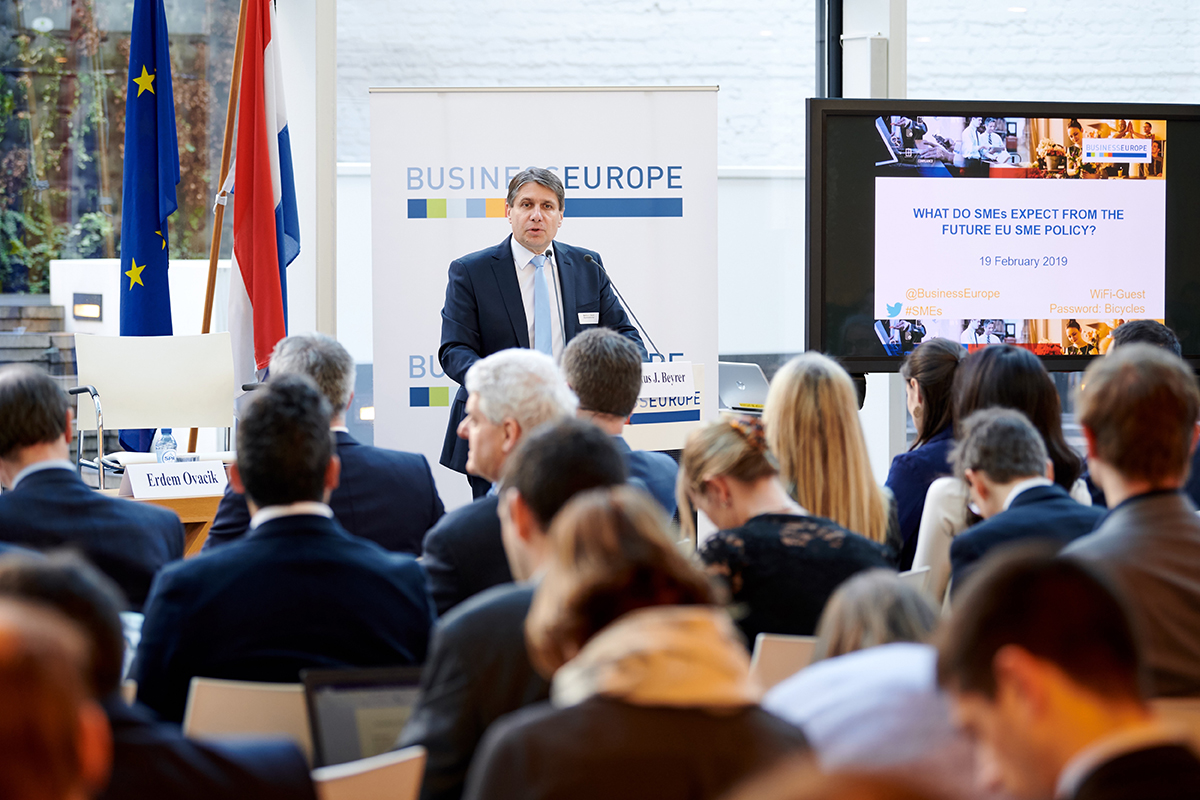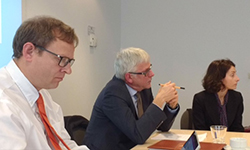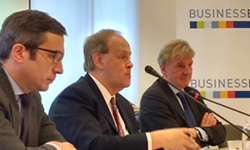BusinessEurope Headlines No. 2019-06
Setting ambitious goals for the future EU SME policy

Small and medium-sized enterprises (SMEs) are one of Europe’s best assets to seize the major opportunities brought by the current changes we are living at the technological, political and economic levels. “The EU SME policy has delivered a number of very encouraging outcomes, yet this is not enough”, Director General Markus J. Beyrer said during the conference “What do SMEs expect from the future EU SME policy?” on 19 February in Brussels. “Today we call for strengthening the EU SME policy”, he added; “a massive job remains to be done”. At the event, BusinessEurope presented its latest memorandum calling for fresh measures on the EU SME policy action agenda. Other panellists included Sandra Gallina, Deputy Director General of Directorate General for Trade of the European Commission, Kristin Schreiber, Director of the COSME Programme and SME Competitiveness (Directorate General for Internal Market, Industry, Entrepreneurship and SMEs), the Member of the European Parliament Andreas Schwab, and CEOs of SMEs. See the event pictures.
![]() Contact: Daniel Cloquet
Contact: Daniel Cloquet
Video message on a Europe with opportunities for all
President Pierre Gattaz talks about the business ambition for Europe for 2030 - a Europe with opportunities for all – and the conditions that must be put in place to allow companies to play their role in society.
Discussion on the definitive VAT-system with the European Commission
 Following the European Commission's number of recent proposals on VAT-reform, BusinessEurope's VAT Group were pleased to welcome Werner Blockmans and Ambra Dell’Aversano - officials from the Commission's Directorate-General for Taxation and Customs Unions (DG TAXUD) - at its meeting on 20 February. They gave an explanation of the Commission’s proposal for a definitive VAT-system, and replied to questions from the group. The VAT-group supports, in particular, the Commission’s efforts to further improve and broaden the One-Stop-Shop, but warned that the Commission’s proposal for a definitive VAT-system will significantly increase compliance costs, impact cash-flow and may not reduce overall VAT-fraud.
Following the European Commission's number of recent proposals on VAT-reform, BusinessEurope's VAT Group were pleased to welcome Werner Blockmans and Ambra Dell’Aversano - officials from the Commission's Directorate-General for Taxation and Customs Unions (DG TAXUD) - at its meeting on 20 February. They gave an explanation of the Commission’s proposal for a definitive VAT-system, and replied to questions from the group. The VAT-group supports, in particular, the Commission’s efforts to further improve and broaden the One-Stop-Shop, but warned that the Commission’s proposal for a definitive VAT-system will significantly increase compliance costs, impact cash-flow and may not reduce overall VAT-fraud.
Contact: Pieter Baert
Next steps on digital taxation
 Following the publication of the Organisation for Economic Co-operation and Development’s (OECD) public consultation on digital taxation, and with the aim to help to improve the current debate on the taxation of the digital economy, BusinessEurope hosted a conference “Taxation of the Digital Economy – analysing the OECD approach”, on 19 February in Brussels. At the conference, CopenhagenEconomics presented a study on how the marketing intangibles approach, whereby a company’s profit is allocated to a market jurisdiction based on investment in marketing intangibles in that jurisdiction may affect small export-oriented countries. In a panel debate with Georg Geberth (Global Tax Policy Director, Siemens) and Sigurd Næss-Schmidt (Director, CopenhagenEconomics), Krister Andersson, chair of the Tax Policy Group at BusinessEurope, welcomed the recent OECD work, stressing that only through a global consensus on digital taxation can we hope to reform the global tax system in a coherent and lasting way.
Following the publication of the Organisation for Economic Co-operation and Development’s (OECD) public consultation on digital taxation, and with the aim to help to improve the current debate on the taxation of the digital economy, BusinessEurope hosted a conference “Taxation of the Digital Economy – analysing the OECD approach”, on 19 February in Brussels. At the conference, CopenhagenEconomics presented a study on how the marketing intangibles approach, whereby a company’s profit is allocated to a market jurisdiction based on investment in marketing intangibles in that jurisdiction may affect small export-oriented countries. In a panel debate with Georg Geberth (Global Tax Policy Director, Siemens) and Sigurd Næss-Schmidt (Director, CopenhagenEconomics), Krister Andersson, chair of the Tax Policy Group at BusinessEurope, welcomed the recent OECD work, stressing that only through a global consensus on digital taxation can we hope to reform the global tax system in a coherent and lasting way.
Contact: Pieter Baert
Market participants need more time to use international benchmarks
 Transitional provisions in the EU Benchmark Regulation should be extended, BusinessEurope Director General Markus J. Beyrer wrote to European Commission Vice-President Valdis Dombrovskis. The EU Benchmarks Regulation prohibits banks to use important benchmarks on interest rates, currencies, equities and commodity prices in financial instruments as of 1 January 2020. Consequently, non-financial companies which use these financial instruments to hedge against risks related to their operative business will no longer be able to do so. This affects contracts, not only related to more distant markets like China, India, and South America but also neighbouring ones like Turkey and Russia. The transitional provisions in the Benchmarks Regulation should be extended so that market participants get more time to adjust.
Transitional provisions in the EU Benchmark Regulation should be extended, BusinessEurope Director General Markus J. Beyrer wrote to European Commission Vice-President Valdis Dombrovskis. The EU Benchmarks Regulation prohibits banks to use important benchmarks on interest rates, currencies, equities and commodity prices in financial instruments as of 1 January 2020. Consequently, non-financial companies which use these financial instruments to hedge against risks related to their operative business will no longer be able to do so. This affects contracts, not only related to more distant markets like China, India, and South America but also neighbouring ones like Turkey and Russia. The transitional provisions in the Benchmarks Regulation should be extended so that market participants get more time to adjust.
![]() Contact: Erik Berggren
Contact: Erik Berggren
Calendar
- 26 February: High-level Conference “Multimodal transport – towards the future”
- 27 February: European semester winter package
- 28 February: EESC event: Civil society and the path to a carbon-neutral Europe by 2050
- 4 March: Transport, Telecommunications and Energy Council
- 5 March: Environment Council
- 6-7 March: 2019 Circular economy stakeholder conference: Success stories and new challenges
Reminder: please take a look at our revised privacy policy